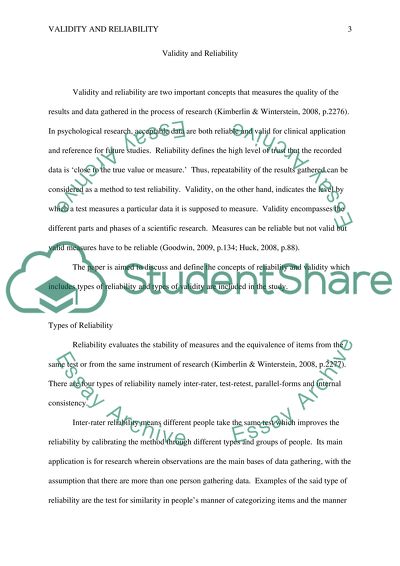

What seems more relevant when discussing qualitative studies is their validity, which very often is being addressed with regard to three common threats to validity in qualitative studies, namely researcher bias, reactivity and respondent bias (Lincoln and Guba, 1985). In qualitative interviews, this issue relates to a number of practical aspects of the process of interviewing, including the wording of interview questions, establishing rapport with the interviewees and considering ‘power relationship’ between the interviewer and the participant (e.g. Reliability in qualitative studies is mostly a matter of “being thorough, careful and honest in carrying out the research” (Robson, 2002: 176). Things are slightly different, however, in Qualitative research. In Quantitative research, reliability refers to consistency of certain measurements, and validity – to whether these measurements “measure what they are supposed to measure”. So, there is high reliability but low validity.What is Validity and Reliability in Qualitative research? The experiment has been repeated with the same results. The measurement will be the same, allowing for a small margin of change for positioning of the tape measure).

Then ask them what will happen if they repeat the measurement (and get them to do this). From this you can introduce the term validity – you are not measuring intelligence, you are measuring head size. Clearly this is not the case and discussions will ensue. Once they have made a note of this tell them that this is a measure of intelligence – the larger the head, the more intelligence. Instruct students to work in pairs and to measure the circumference of each other’s head. Validity is whether you are measuringĪ good example of how to illustrate this in a lesson is using fabric tape measures (perhaps the ones you can find in that well-known Swedish furniture ReliabilityĬan be thought of as repeatability – the extent to which, if you repeated the research, you would get the same results. Perhaps it did, but what is more likely is that it lacked one of these. That is, try to avoid, “the study lacked reliability and validity”. Many students get a little muddled initially by these two concepts and so it may be helpful, at first, to suggest that they avoid using them in the same Research Methods Validity and Reliability


 0 kommentar(er)
0 kommentar(er)
